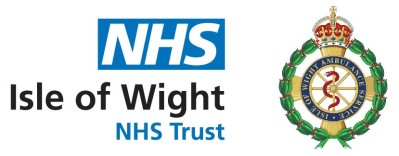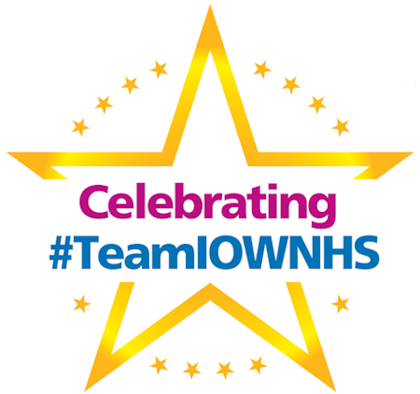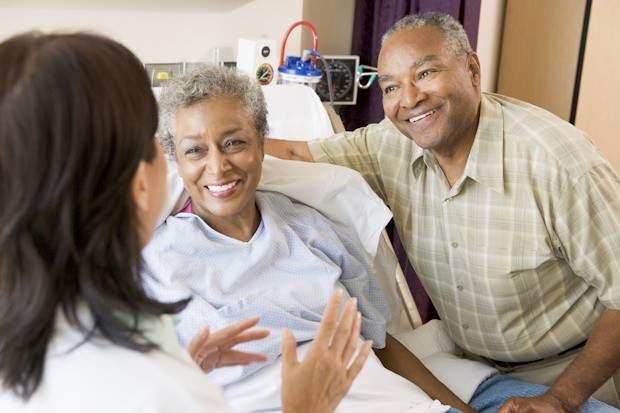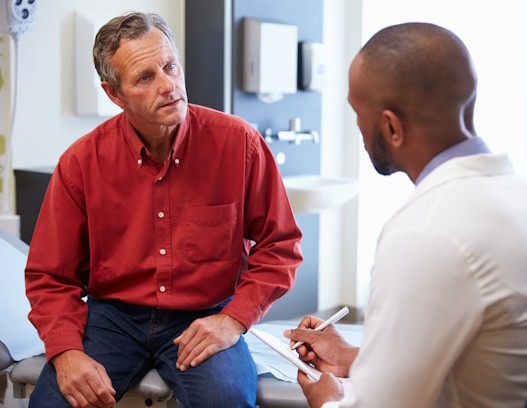Welcome to the Breast Screening service at the Isle of Wight NHS Trust
Breast Screening is a well-woman service and uses x-rays called mammograms to check your breasts for signs of cancer. The screening is carried out by health specialists called mammographers.
Anyone registered with a GP as female will be invited for NHS Breast Screening every 3 years between the ages of 50 and 71.
A British Sign Language version of the breast screening information is available in this video Taking Part in Breast Screening.
Breast Screening is a well-woman, early-detection service that uses x-rays called mammograms to check your breasts for signs of cancer. This test is carried out by female health specialists called mammographers and aims to identify any signs of cancer early.
Mammograms take x-ray images of your breasts by compressing the breast between two flat plates on the machine. This allows for a clear picture to be taken.
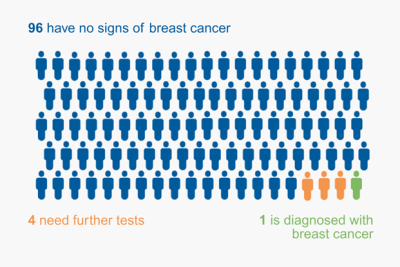
A mammogram is a low dose x-ray. Each breast is positioned in turn on the x-ray machine and gently but firmly compressed with a clear plate. The compression only lasts a few seconds and does not cause any harm to the breasts.
Compression is needed to keep the breast still and to get the clearest picture with the lowest amount of radiation possible. This process only lasts a few moments.
Some women find compression slightly uncomfortable and some feel short-lived pain. Research has shown that for most women it is less painful than having a blood test and compares with having blood pressure measured.
You usually have 2 x-rays from each breast, one from the top and one from the side.
Talk to your mammographer if you are nervous or embarrassed, or if you are finding the mammogram too painful. They can stop at any time and try to make you more comfortable.
Breast cancer is the most common type of cancer in the UK, with the chance of getting breast cancer increasing as you get older. Breast Screening is a national screening programme that was launched to support early detection of signs of cancer, often identifying signs before you experience symptoms. The programme successfully saves around 1,300 lives per year, with early detection often meaning simpler treatment options.
Finding cancer early can make it:
- More likely that treatment will be successful
- Less likely that you would need to have breast removal surgery (mastectomy)
- More likely that you will be cured.
Women Aged 50-71: Anyone registered with a GP as female will be invited for NHS breast screening every 3 years between the ages of 50 and 71. You'll get a letter in the post inviting you for your first invite between the ages of 50 and 53. Then you'll be invited every 3 years until you turn 71.
Higher Risk Women: Some people have a higher risk of developing breast cancer. ‘High Risk’ means that you have been assessed by a specialist in genetics or oncology as being at more risk of developing breast cancer than women in the general population. People at high risk of breast cancer are offered breast screening at an earlier age than others in the general population. We call this ‘surveillance’ screening.
Self-Referral: Women over the age of 71 are not automatically invited to attend screening, however, they are welcome to contact us and self-refer themselves every 3 years.
On arrival to the site, you will be greeted by a female member of staff who will check your personal details and shall offer you a seat in our dedicated waiting area.
When the staff are ready, a female mammographer will then take you for a mammogram. The staff member will explain what will happen when the mammograms are taken and answer any queries you may have. Once you are happy to proceed, the mammographer will ask you to undress down to the waist and shall then take the mammogram.
We advise that all women wear separates, and this allows you to strip down from the waist up.
We ask that you avoid using talcum powder, body oils and spray deodorants as this can affect the image we take.
Depending on the location of the jewellery will determine if it needs to be removed. Some jewellery can cause what is called an artefact on your imaging and may mean that the scan will need to be repeated on the day or at a later point, to get a good quality image. It is therefore advisable to remove necklaces.
A mammogram should only take a few minutes, whilst the whole appointment is expected to last about 30 minutes. This allows the mammographer to confirm your details, explain the test, and confirm if you have any concerns about your breasts prior to the scan.
Once the mammogram is finished, the mammography practitioner will explain how and when you should expect to receive your results.
All mammograms are examined by at least two different film readers and a final result established. Results are sent out within two weeks of the original mammogram. Your GP is also informed of the result.
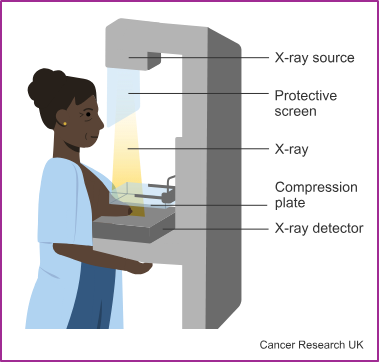
All mammograms are examined by at least two different film readers and a final result established. We aim to process all results within 14 days. Please expect to receive your results around 3 weeks after your breast screening appointment.
You will receive a letter informing you of the result of your mammogram and your GP will also receive a report notifying them of the result.
There are three possible results at this stage:
- Normal/No Further Tests Needed: No abnormalities have been seen and the film readers are happy for your to return for a routine recall in three years’ time. Most people (around 96/100 people) receive this result. It means that we have not identified any signs of breast cancer, and you will not need any further tests.
- Second Stage Screening: The film readers have seen an area of concern or change in your mammograms, and they would like to perform some more tests.
- Technical Recall: For technical reasons some images need to be repeated before a final result can be established. You will be asked to return to the breast screening unit for the images to be repeated. These will then be examined in the normal manner.
If you have not received your result and feel that you should have, then please contact the Breast Screening Unit.
Screening is your choice, and you have the option to cease appointments.
If you do not want to be invited for screening, please contact your GP or the Breast Screening Unit to request that breast screening invitations are stopped. We will ask you to sign documentation confirming your wishes to stop screening.
You will always have the opportunity to start screening again if you change your mind.
Can I call and book a breast screening appointment?
As long as you are registered with a GP practice in our area and are between the ages of 50 & 71 you will be automatically invited for a mammogram every three years. This means that you are not required to book directly with us.
If you are over the age of 71, or have recently missed an appointment, please call the Breast Screening Unit.
I have mobility issues, can I still attend?
We have the facilities to be able to cater for most women. We offer extended clinic times in order to support you throughout the appointment, should you require.
If you have any concerns, please contact the Breast Screening Unit.
I have previously been treated for breast cancer, does screening still apply to me?
Yes, providing it has been over 6 months since your last mammogram.
It is an extra and valuable check on your breasts. However, if you are still under breast cancer care and have annual mammograms, then please contact the Breast Screening Unit.
I am transgender, can I still have breast screening?
- Trans women and non-binary people assigned male at birth who are registered with a GP as female are invited for breast screening.
- Trans women and non-binary people assigned male at birth who are registered with a GP as male are not routinely invited for breast screening but can request screening.
- Trans men and non-binary people assigned female at birth who are registered with a GP as female will be invited for breast screening.
- Trans men and non-binary people assigned female at birth who are registered with a GP as male are not routinely invited for breast screening but can request screening if they still have breast tissue that needs screening.
It is important that you feel that you are treated with dignity and respect at all times. If you have any concerns about attending for your mammogram, please contact the Breast Feeding Unit. We can adjust your appointment to ensure you are comfortable.
Do I need to let you know if I have had mammograms elsewhere?
Yes, there may be some situations where we need to compare your recent imaging with any previous and therefore it is important that if you know where and when it took place, that you let us know when you come for your mammogram.
Does the mammogram hurt or cause damage?
During the mammogram your breasts will be compressed quite tightly for a few seconds. You may find this uncomfortable, and a small percentage of women do find this test painful. Research has shown that for most women it is less painful than having a blood test and compares with having blood pressure measured.
We advise that if you get sore or tender breasts, particularly when your period is due, you can contact us to reschedule your appointment to a different time of the month.
If pain persists after the appointment, we recommend that you contact your GP.
Age Related Questions:
I am 50 and haven’t received an invitation yet, why?
Your first invitation can arrive at any time between your 50th and 53rd birthday. If you have not received an invitation after this time, please contact the Breast Screening Unit.
I am coming up to 70 years of age, will I still be invited for 3 yearly mammograms?
Women over the age of 71 are not automatically invited to attend screening, however, they are welcome to contact us and self-refer themselves every 3 years.
Health Related Questions:
I have a symptom or concern regarding my breasts, can I come for a screening mammogram?
Screening is a well-woman service. If you have any breast symptoms or concerns, please contact your GP for the next steps.
Can I have a screening mammogram if I have had a bilateral mastectomy?
Following a mastectomy, there is insufficient breast tissue for a successful diagnosis. However, please contact the Breast Screening Unit, so that we can appropriately update our records and stop sending you appointments.
I am pregnant, can I still have breast screening?
The radiation dose in mammography is regarded as being insufficient to harm the foetus so this means that you can still attend breast screening when invited.
We ask that you inform your mammographer when you attend.
I am breast feeding, can I still have breast screening?
Mammography is not undertaken until three months after lactation stops, unless otherwise justified by a Consultant Radiologist.
If you are breast feeding when you receive your invitation, please contact us to rearrange.
Can I have a mammogram if I have breast implants?
Yes, you can still have a mammogram, but we will ask you to sign a consent form at your appointment. Please call our screening office to make us aware if you have breast implants so that we can appropriately update our records.
It is important to know what your breasts usually look and feel like, so that you know what is normal for you. This makes it easier to notice any changes to your breasts.
The symptoms listed, including breast lumps, are very common and can be caused by many conditions.
- A lump or swelling in your breast, chest or armpit
- A change in the skin of your breast, such as dimpling or redness (rashes or changes in skin colour may be harder to see on black or brown skin)
- An orange peel appearance, where the skin may be thicker and pores are more obvious
- A change in size or shape of 1 or both breasts
- Nipple discharge, which may have blood in it
- A change in the shape or look of your nipple, such as it pulling inwards (inverted nipple) or a rash on it (may look like eczema)
Having these symptoms does not definitely mean you have breast cancer, but if you have any of these symptoms, please speak to your GP as soon as possible. Ask the GP reception team for an urgent appointment. It is important to do this even if you have recently had breast screening.
If your symptoms are caused by cancer, finding it early can mean its easier to treat.
- Look at your breasts or chest in a mirror to look for any changes. Start with your arms by your sides and then raise them.
- Feel around each breast or side of your chest in a circular motion all the way up to your collarbone and under each armpit. Use a mix of light and firmer pressure. Do not press so hard it hurts.
- Feel around and over each nipple.
- You may find it easier to feel your breasts or chest in the shower or lying down.
